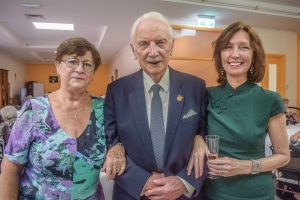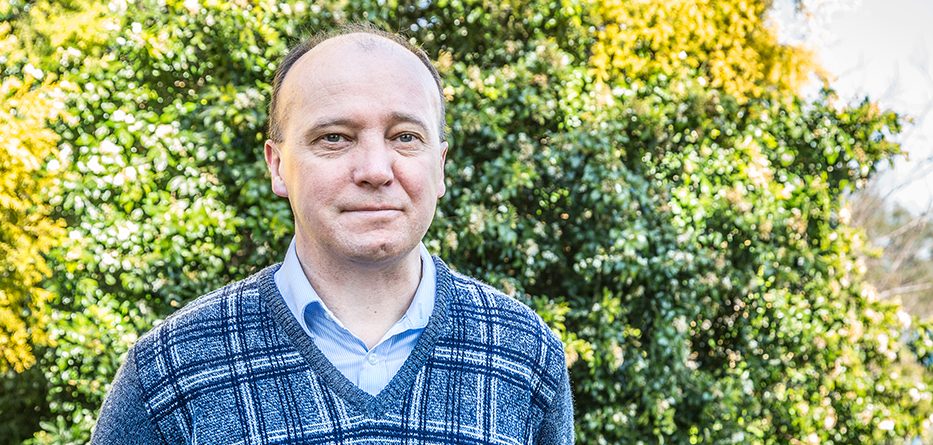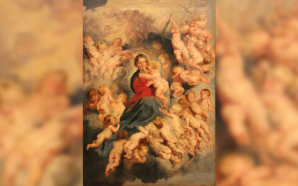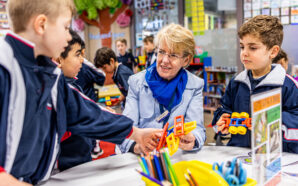In the most vulnerable moments of life, when loved ones are ageing and in need of care, the hands of those who serve in the Hungarian Catholic Community are connecting people to their faith through the preservation of customs, values and language.
Fr Dénes Ledeczi, Chaplain to the Hungarian Catholic Community and Assistant Priest at Mary, Queen of the Family Parish in Blacktown, believes it is by the work of human hands that Christ’s mercy can be seen in the everyday.
“As the chaplain, I provide pastoral care to the aged care centre, St Elizabeth Home,” he explained.
“It is through the blessing of the hands that those who serve can be an instrument of Christ’s healing. There are kitchen, cleaning and nursing staff, all of whom care for the elderly.
“We are a strong, service-driven people.”
The nursing home is named after St Elizabeth of Hungary (1207-1231), who is the patroness of the Franciscan tertiaries and one of the most prominent Catholics in Hungary’s long history.
As a princess of Hungary, she chose to live simply and funded a Franciscan hospital, devoting herself to the care of the sick until her death at age 24. The spirit and benevolence of St Elizabeth is what drove the community to build the St Elizabeth Home.
Fr Dénes has been the chaplain since 2011 and works throughout Parramatta, Wollongong and Canberra, ministering to the spiritual and pastoral care of Hungarian-Australians.
The Hungarian Catholic Community bridges the gap between Australia and Hungary through the faith. With 2000 people involved, Fr Dénes recognises the need of those in retirement to feel close to their faith in their native tongue.
“I feel close to them because of the language. I am able to provide the sacraments, visit the sick, provide spiritual talks and be there for them in their struggles,” Fr Dénes said.
Many Hungarian migrants escaped communist regimes after the Second World War and it was this fight to keep their Catholic faith that details their strength in faith today.
The chaplaincy not only includes those who came from the borders of the modern Hungary state, but those who escaped from the former Yugoslavia under the Tito regime between 1965 and 1972.
“The Hungarian Catholic Community also has good relations with the Hungarian Reformed Church in Sydney. Four times a year we celebrate together through an ecumenical service on our Hungarian national feast days,” Fr Dénes explained.
The South Hungarian Club in Glendenning holds a Gypsy Ball honouring the Romani, a people who have a rich and unique culture and heritage throughout Europe. The Club also holds the Hungarian national feast day celebrations and is a centre of the Hungarian Consulate, providing official hours to the Hungarians.
The chaplaincy has a national pilgrimage twice a year to the Our Lady of Mercy Shrine at Penrose Park, run by the Order of St Paul the First Hermit. Blessed Eusebius of Hungary was the founder of the Order of Saint Paul the First Hermit, signing his name as the first provincial in 1256.
Fr Dénes is one of many Hungarian chaplains around the world who work under the guidance of Bishop Francis Cserháti, a member of the Hungarian Catholic Bishops’ Conference who is in charge of the pastoral care of Hungarians living abroad. Fr Dénes said he enjoys a good friendship with Bishop Francis, who visited the community in 2012.
Clara Korompay, President of the Hungarian Catholic Community, says she is grateful to Fr Dénes for his continuing spiritual guidance and willingness to offer practical advice and support.
Hungarian Catholic Community united in the faith
By Clara Korompay

From left: Clara Korompay with former President of the Hungarian Catholic Community, George Goor and CEO of St Elizabeth Home, Judith Gonye, celebrating Mr Goor’s 90th birthday. PHOTO SUPPLIED.
Between 1949 and 1952, the Australian Government accepted 15,000 Hungarians as ‘Displaced Persons’. As one of that number, I arrived in Newcastle with my parents and brother at the age of six. In 1956, after the Hungarian Revolution, Australia accepted another 14,000 refugees.
In these early days, we Hungarians clung together, creating various societies and associations. One of these groups was formed by those united in the Catholic faith.
In 1950, a Jesuit priest, Fr Forro SJ, was posted to Australia to minister to Hungarian immigrants. Through his leadership, the Hungarian community was galvanised into raising funds to build a hostel in 1967 for elderly Hungarians in Dean Park, now known as the St Elizabeth Home.
His efforts united the Hungarian Catholics and the largely scattered and demoralised émigré community. I remember the fundraising activities in which my parents were involved. Together, with the Hungarian Ursuline nuns, the Home expanded over the years to become a Catholic aged-care facility with more than 130 residents.
Our mothers baked, cooked and embroidered, whilst our fathers created boxes, magazine racks and stools etched with Hungarian motifs to sell at the Home’s annual fete to raise money to bring to fruition Fr Forro’s vision.
The chaplaincy and Home are inextricably linked. The building of the chapel some 20 years ago, enables our chaplain, Fr Dénes, to celebrate Hungarian Mass every Sunday, making it possible for residents to attend alongside our community.
We continue to celebrate and commemorate important historical and religious occasions. Every year, a fete is held in commemoration of St Elizabeth with about 1000 people attending. Once again, at this year’s fete (to be held on Sunday 20 November), Hungarian food and craft will be sold. Families can expect to meet old acquaintances and, most importantly, our chapel overflows for the ecumenical service.
This community, in turn, has come to be involved in their local parishes via their children and grandchildren. Recently, a concerted effort has been made to reinvigorate and formalise the Hungarian Catholic Community.
The St Elizabeth Caritas Hungarian Association in Ashfield continues to provide practical and spiritual support for those in need. The Hungarian diaspora can feel proud of the practical, social, emotional and spiritual achievements of the Hungarian Catholic Community.
Clara Korompay OAM is President of the Hungarian Catholic Community.








